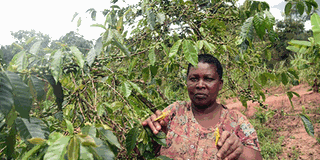Securing women farmers' future

A farmer displays desert locusts at her farm in Kangurwe village in Mukurweini, Nyeri County. PHOTO | EVANS HABIL | NATION MEDIA GROUP
Misery, is what Ms Lucy Ngima describes as her current situation.
When locusts descended on her farm in Tharaka Nithi, her hopes were crushed as the pests devoured her green-grams, cowpeas and millet farm. She had anticipated a Sh90,000 profit by the end of May but the sudden turn of events completely disorganised her plans.
Like many other farmers in Kaburi village, Ms Ngima says she had invested significantly, and nothing could have prepared her for the destruction the locusts beset on her.
“I spent all my money hoping to get a bumper harvest but instead, I have incurred a huge loss completely affecting my financial stability. I am struggling to raise my three children and with the current situation, my future looks bleak,” says Ms Ngima, a widow.
Tharaka Nithi is one of the 27 counties in the country that was ravaged by the locusts’ invasion, leaving thousands of acres of crops and pasture destroyed.
Described by Food and Agriculture Organisation (FAO) as the worst invasion in Kenya in the last 70 years, the pests have predisposed the country to a major food security situation in the coming months.
In female-headed households, women face the double burden of providing adequate and nutritious meals for their families. This predicament exposes them to malnutrition and even a bigger risk of poverty.
To protect farmers from the uncertainties in their trade, insurance companies have tailored products to cushion them from adversities of weather and unforeseeable calamities. For instance, had she insured her crop, Ms Ngima would have redeemed Sh63,000 to buy fresh farm inputs.
APA Insurance chief executive officer Mr Ashok Shah says lack of information on insurance has disadvantaged local farmers.
Subsistence farming
“Women contribute to 80 per cent of farmers and/or are engaged in farming activities globally, yet they lack the control of the land they work on and are disadvantaged on information gathering,” says Mr Shah.
For this reason, many practice subsistence farming and the output is not a guarantee, he adds.
Ms Ngima admits that she has never heard of insurance in farming and if she got the information, she would definitely consider insurance.
Prof Paul Kimurto, an agriculture and climate resilience expert, says lack of information places women at a disadvantage, compounded by the burden of unpaid care work.
“Many women do not control farm assets which can be used to secure loans or insurance for their farm investments automatically edging them out of the competitive market,” he says.
He adds that women are also looped in poverty owing to their involvement in production, management and consumption.
“Their situation would change for women who constitute 75 to 89 per cent of Kenya’s agricultural labour if they were engaged as owners and controllers of farms and farms assets,” he argues.
“It is time insurers considered offering women crop insurance without asking for capital, title deeds or other assets,” says the agriculture and climate resilience expert.
And with FAO’s warning of a second wave of locusts’ invasion that would be more devastating, many women like Ms Ngima without a crop insurance, would fall into untold misery.





